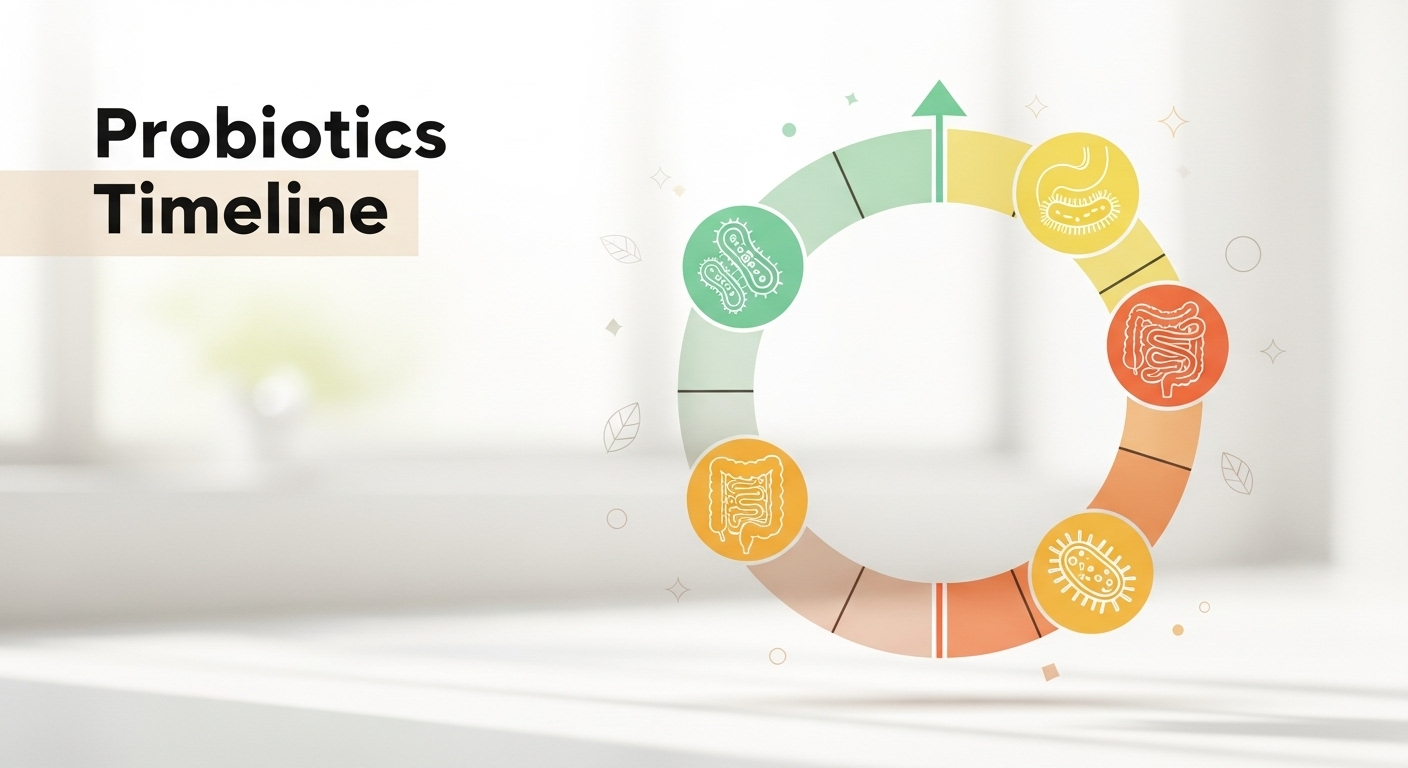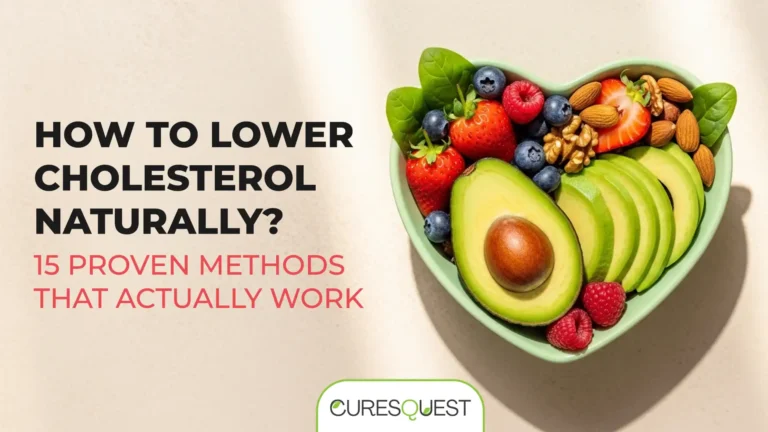Book Appointment Now

How Long Does It Take for Probiotics to Work for Digestive Issues? 7 Key Factors and Realistic Timelines for Relief
If you’ve been dealing with nagging digestive problems like bloating, constipation, or irregular bowel movements, you might be wondering: how long does it take for probiotics to work for digestive issues? It’s a common question among those seeking natural ways to improve gut health. The answer isn’t one-size-fits-all, but generally, you could start noticing improvements in a few days to several weeks, depending on various factors we’ll explore in this guide.
Table of Contents
What Are Probiotics and How Do They Help Digestive Issues?
Probiotics are live microorganisms, often referred to as “good bacteria,” that provide health benefits when consumed in adequate amounts. They’re found in fermented foods like yogurt, sauerkraut, and kimchi, or taken as supplements. For digestive issues, probiotics help restore balance to your gut microbiome, which can become disrupted by factors like poor diet, stress, or antibiotics.
Imagine your gut as a bustling city where trillions of bacteria live in harmony. When bad bacteria overrun the good ones, problems like diarrhea or bloating arise. Probiotics act like reinforcements, helping to crowd out the troublemakers and promote smoother digestion.
According to experts, probiotics can support nutrient absorption, strengthen the intestinal barrier, and even influence your immune system. This makes them a popular choice for addressing common digestive woes without relying solely on medications.
How Do Probiotics Work in Your Gut?
Once ingested, probiotics must survive the harsh acidic environment of your stomach to reach the intestines, where they can colonize and exert their effects. They produce substances that inhibit harmful bacteria, enhance the gut lining, and modulate inflammation.
For instance, certain strains help break down food more efficiently, reducing symptoms like gas and bloating. Others stimulate bowel movements to alleviate constipation. The key is that probiotics don’t just mask symptoms—they address the root cause by fostering a healthier gut ecosystem.
Research shows that probiotics can interact with your immune cells, potentially reducing the frequency of digestive upsets over time. It’s like giving your gut a tune-up for long-term performance.
General Timeline: How Long Does It Take for Probiotics to Work?
The burning question—how long does it take for probiotics to work for digestive issues—depends on the specific problem and individual factors. In general, acute issues like traveler’s diarrhea might see relief in as little as 1-2 days, while chronic conditions like IBS could take 4-12 weeks for noticeable improvements.
Many people report initial changes, such as reduced bloating, within a week of consistent use. However, full benefits often emerge after 2-3 months as the gut microbiome stabilizes. Patience is crucial; stopping too soon might mean missing out on the rewards.
Think of it like planting seeds in a garden. You won’t see sprouts overnight, but with regular care, you’ll eventually have a thriving plot.
Probiotics for Diarrhea: Expected Timeframe
Diarrhea, whether from infections, antibiotics, or travel, can be debilitating. Fortunately, probiotics shine here. Studies indicate they can shorten bouts of infectious diarrhea by about 1-2 days, especially in children.
Strains like Saccharomyces boulardii and Lactobacillus rhamnosus are particularly effective, working by restoring gut balance quickly. For antibiotic-associated diarrhea, starting probiotics alongside treatment can prevent or reduce symptoms within days.
If you’re dealing with this issue, aim for supplements with at least 5 billion CFUs and take them consistently. Many users feel relief almost immediately, but full resolution might take a couple of days.
Probiotics for Constipation: When to Expect Relief
Constipation affects millions, leading to discomfort and frustration. Probiotics can help by increasing gut transit time and softening stools. A Harvard review found that they boost weekly bowel movements by about 1.3 and reduce transit time by 12.4 hours.
Strains such as Bifidobacterium lactis show promise, with improvements often seen in 2-4 weeks of daily use. It’s not instant, but consistent intake can lead to more regular habits without the harsh effects of laxatives.
Pair probiotics with fiber-rich foods for even better results. One real-life example: A friend of mine struggled with chronic constipation until adding a probiotic yogurt to her routine—within a month, she felt like a new person.
Probiotics for IBS: Timeline for Symptom Improvement
Irritable bowel syndrome (IBS) is complex, with symptoms varying widely. How long does it take for probiotics to work for digestive issues like IBS? Research suggests 4-12 weeks for significant relief in pain, bloating, and bowel irregularities.
In one study, 78% of participants reported good or excellent improvement after four weeks with Lactobacillus plantarum. Multi-strain probiotics like VSL#3 also show benefits over similar periods.
If you have IBS, track your symptoms in a journal. You might notice subtle changes early on, building to major improvements with time.
Probiotics for Bloating and Gas: How Quickly Do They Help?
Bloating and gas are common digestive complaints, often linked to imbalanced gut flora. Probiotics can reduce these by breaking down gas-producing compounds. Many people experience less discomfort within 1-2 weeks.
Strains like Bifidobacterium infantis are effective for bloating in IBS patients, with studies showing reductions after four weeks. Start with a low dose to minimize initial gas, which can sometimes occur as your gut adjusts.
It’s like deflating a balloon—gradual but satisfying relief as balance is restored.
7 Key Factors That Influence How Long Probiotics Take to Work for Digestive Issues
Several elements determine the speed of results. Understanding these can help you optimize your approach.
- Strain Specificity: Not all probiotics are equal. Choose strains targeted for your issue, like Lactobacillus for diarrhea.
- Dosage and CFU Count: Higher doses (5-50 billion CFUs) may work faster, but follow recommendations.
- Product Quality: Look for live cultures and proper storage to ensure viability.
- Individual Health: Age, diet, and existing gut health play roles. Healthier individuals might see quicker results.
- Consistency of Use: Daily intake is key; irregular use delays benefits.
- Diet and Lifestyle: Prebiotic-rich foods enhance probiotic effects.
- Underlying Conditions: Severe issues may require longer or medical intervention.
By addressing these, you can potentially shorten the timeline for relief.
Tips to Make Probiotics Work Faster for Your Digestive Health
To accelerate benefits, follow these strategies:
- Take probiotics at the best time—morning on an empty stomach for some strains.
- Combine with prebiotics from foods like garlic and onions.
- Stay hydrated and eat a balanced diet.
- Avoid antibiotics unless necessary, as they can wipe out good bacteria.
- Choose refrigerated products if required for freshness.
Also, consider incorporating fermented foods daily for a natural boost.
| Issue | Recommended Strains | Typical Timeline |
|---|---|---|
| Diarrhea | Saccharomyces boulardii, Lactobacillus rhamnosus | 1-2 days |
| Constipation | Bifidobacterium lactis | 2-4 weeks |
| IBS | Lactobacillus plantarum, Bifidobacterium infantis | 4-12 weeks |
| Bloating | Bifidobacterium bifidum | 1-4 weeks |
Potential Side Effects and When to See a Doctor
While generally safe, probiotics can cause temporary side effects like gas, bloating, or mild diarrhea as your gut adjusts. These usually subside within days.
Seek medical advice if symptoms persist or worsen, or if you have a weakened immune system. Always consult a doctor before starting, especially if pregnant or on medications.
For severe digestive issues, probiotics might complement but not replace professional treatment.
How to Choose the Best Probiotics for Digestive Issues
Select products with evidence-based strains, high CFU counts, and third-party testing. Brands like Culturelle or Align are popular.
Read labels for expiration dates and storage instructions. For digestive issues, multi-strain formulas often work best.
Suggested infographic: A timeline chart showing probiotic effects over weeks.
Check out this WebMD video on probiotics for more insights.
Conclusion: Patience and Consistency Are Key
In wrapping up, how long does it take for probiotics to work for digestive issues varies, but with the right approach, relief is achievable. Remember the 7 factors, choose wisely, and stay consistent for optimal gut health.





